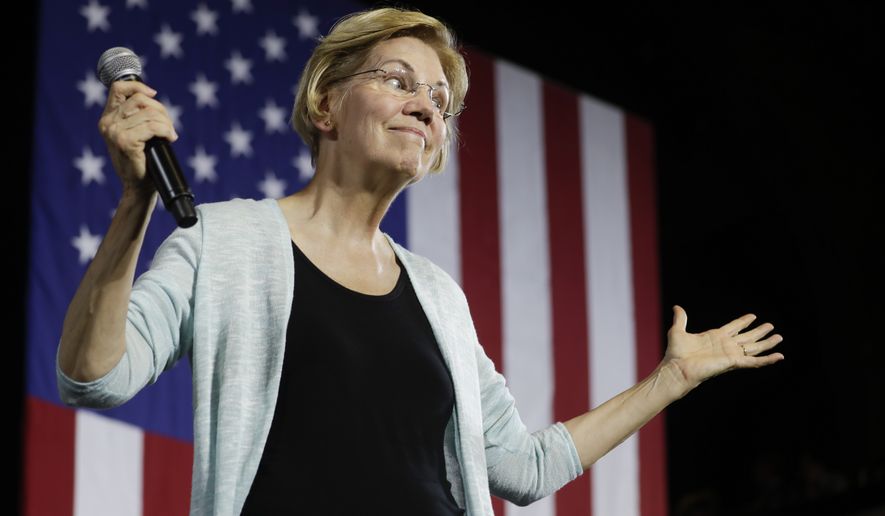Sen. Elizabeth Warren was part of the pro-impeachment stampede of presidential hopefuls in April, taking to Twitter to announce her support for ousting President Trump.
But in the five weeks since former special counsel Robert Mueller testified to Congress, Ms. Warren hasn’t broached the subject on Twitter, focusing instead on themes of corporate greed, Mr. Trump’s “reckless” handling of the economy — and a congratulatory marriage shoutout to actor Dwayne “The Rock” Johnson.
On the campaign trail, Ms. Warren and her fellow presidential hopefuls find themselves fielding more questions about health care and immigration than they do about the Mueller report.
Bret Niles, chairman of the Linn County Democrats in Iowa, said candidates are responding to voters, who seem to have decided that Congress isn’t going to remove Mr. Trump.
“I think most of them, the candidates and the people I talk to, they are resigned to the fact that no matter what the House does, it is going to go nowhere in the Senate,” Mr. Niles said. “So why waste the time and energy to give Trump another platform to talk about how everybody is out to get him?”
Some House Democrats are still agitating for impeachment. A majority of the party’s House members have said they want to at least begin an impeachment inquiry, and Judiciary Committee Chairman Jerrold Nadler, New York Democrat, has told federal judges he is already in the middle of that inquiry.
But the presidential candidates out meeting voters in early-primary states say it’s just not an issue for the party’s base.
“In probably 30 different stops, no one asked me about impeachment,” Montana Gov. Steve Bullock told Democratic strategist David Axelrod in a recent interview for his “Axe Files” podcast. “What they do talk about is, ’Am I going to lose my rural hospital?’ “
That’s not to say Democratic voters don’t support impeachment. Polling shows they do. But they are “much more focused on health care and other bread-and-butter issues,” said Patrick Murray, director of the Polling Institute at Monmouth University.
“When Trump does come up, it’s about beating him at the ballot box,” Mr. Murray said. “I think the presidential candidates realize that impeachment is not an issue that can help them break out of a crowded field … so they spend less time talking about it.”
Monmouth’s latest polling found 69% of Democrats embrace impeachment. But for respondents as a whole, the issue is a loser, with just 35% of all adults backing it.
There was a clear lack of interest in the issue this month at the Iowa State Fair, a must-attend cattle call that puts the candidates in direct contact with voters.
Candidates who previously signaled support for impeachment didn’t mention it in their stump speeches, and voters offered praise for House Speaker Nancy Pelosi, California Democrat, who has tried to pump the brakes on her caucus’ push for impeachment.
“It has been rare that I appreciate Pelosi, but I do at this point,” said David Cline, of Polk City.
House Democrats had hoped Mr. Mueller’s highly anticipated testimony on July 24 would present Mr. Trump’s behavior in such a poor light that the public would demand impeachment, forcing reluctant Republicans to go along.
Instead, Mr. Mueller’s appearance fell far short of what some Democrats had hoped for. There were a few sound bites, but no damning information or smoking guns that weren’t already in Mr. Muellar’s voluminous report. Mr. Mueller said he did not find evidence to accuse Mr. Trump of conspiring with Russia to subvert the 2016 election, though there was evidence he wanted to thwart the investigation.
In the end, the Justice Department concluded no charges could have been brought.
Some House Democrats remain undeterred, with more than three dozen saying the Mueller testimony was worrisome enough that they announced support for impeachment in the weeks afterward.
Kevin Mack, lead strategist of Need to Impeach, an anti-Trump group founded by Democratic presidential candidate Tom Steyer, said he doesn’t see a disconnect between pro-impeachment Democrats on Capitol Hill and the candidates crisscrossing the nation who seem to have turned the page.
“Robert Mueller’s testimony showed there were 199 criminal charges, 7 guilty pleas, 37 indictments and Trump’s presidency can be defined as crimes, corruption and obstruction of justice and it is up to Congress to hold him accountable — not the 2020 candidates,” he said.
Mr. Mack said he is not surprised voters aren’t talking impeachment to the presidential candidates.
“Not even I, who runs the Need to Impeach campaign, would choose impeachment as the No. 1 issue,” he said.
Ms. Warren became the first major presidential contender to call for impeachment on April 19, and others signaled their support — including Sen. Cory A. Booker of New Jersey, Sen. Kamala D. Harris of California and former Rep. Beto O’Rourke of Texas.
The decision turned out to be a financial boon for Warren campaign coffers, according to a New York Times analysis, which found before her announcement there were 68 days in which she raised less than $50,000, but she surpassed that benchmark every day for two months afterward.
Ms. Warren repeated her conclusions in a tweet on July 24, the day that Mr. Mueller testified: “It’s time to begin impeachment proceedings.”
But she has gone silent since, both on Twitter and in a series of campaign stops, including in Seattle, where she drew a crowd of 15,000 and focused her message on her plans to “root out corruption,” empowering unions and enacting a “wealth tax” on the ultra-rich.
The Warren camp did not respond to an email seeking comment.
• Seth McLaughlin can be reached at smclaughlin@washingtontimes.com.




Please read our comment policy before commenting.